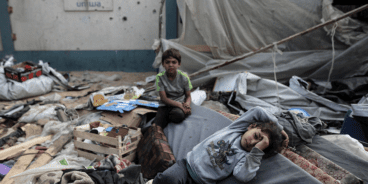
UNA-UK, Global Centre for the Responsibility to Protect and Protection Approaches joint statement on UK House of Lords Debate on the Responsibility to Protect
Following a United Kingdom (UK) House of Lords Debate, which took place in London on 16 July 2015, the Global Centre for the Responsibility to Protect, UNA-UK and Protection Approaches released a joint statement encouraging the UK government to support veto restraint in mass atrocity situations, make explicit reference to its commitment to R2P in the upcoming National Security Strategy, and acknowledge that the prevention of conflict and mass atrocity crimes is in the UK’s national interest and reflective of the UK’s humanitarian values.
UNA-UK, Global Centre for the Responsibility to Protect and Protection Approaches joint statement on UK House of Lords Debate on the Responsibility to Protect
The United Nations Association – UK, The Global Centre for the Responsibility to Protect and Protection Approaches welcome the debate on the “Responsibility to Protect and its application by the UK and the UN” in the House of Lords on 16 July 2015.
We are encouraged by the constructive tone of the debate and the show of cross- party support for the principle of the Responsibility to Protect (R2P) ten years since it was agreed at the UN World Summit.
We echo the calls for the UK to ensure that the prevention of genocide, crimes against humanity, war crimes and ethnic cleansing is a policy and budgetary priority. We also endorse the demands for the UK to give unambiguous support to the French proposal to voluntarily refrain from using the veto in cases of mass atrocities.
We welcome the UK Government’s statement that “R2P, like all security policies, will be considered as part of the Strategic Defence and Security Review” and that the Government will be “unrelenting in using the UK’s global role to tackle atrocity crimes”, employing a “long-term, comprehensive approach using our diplomats, our overseas aid and our world class Armed Forces” to do so.
We encourage the UK Government to make explicit reference to its commitment to the Responsibility to Protect in the upcoming National Security Strategy and acknowledge that the prevention of conflict and mass atrocity crimes is in the UK’s national interest and reflective of the UK’s humanitarian values.
Today, we can see the cost of failure to prevent atrocities, from Syria and Iraq to South Sudan, Myanmar and beyond. Millions of people are fleeing their homes, straining the humanitarian system to breaking point. Development gains are being reversed in entire regions; and violence is crossing borders, threatening global security. The UK must ensure that it has the capacity to prevent and respond appropriately to the threat and commission of atrocity crimes.
Related Content
